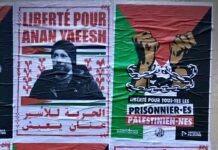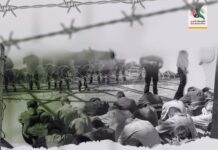 As Palestinian prisoners entered their 11th day of hunger strike in the Strike for Freedom and Dignity, they were joined by a mass general strike for commerce, labor, governmental and educational sectors throughout the occupied West Bank and Gaza Strip.
As Palestinian prisoners entered their 11th day of hunger strike in the Strike for Freedom and Dignity, they were joined by a mass general strike for commerce, labor, governmental and educational sectors throughout the occupied West Bank and Gaza Strip.
Palestinian streets were almost empty of cars and passers-by, reported Ma’an News, throughout cities, towns, villages and refugee camps.
Shops, banks, factories, government institutions, universities are all closed; the only exceptions to the strike are high schools and emergency medical services and hospitals.
Over 1,500 Palestinian prisoners launched the hunger strike on 17 April, Palestinian Prisoners’ Day, to achieve a series of demands, including an end to the denial of family visits, the right to education, appropriate medical care for Palestinian prisoners and an end to solitary confinement and “administrative detention,” imprisonment without charge or trial.
Additional prisoners continued to join the strike on Thursday, as former long-term hunger striker Samer Issawi and six of his comrades from the Democratic Front for the Liberation of Palestine joined the strike in the Negev desert prison.
The strikers have been met with significant repression from the Israeli prison administration, including the denial of legal visits from Palestinian lawyers. Of all the hunger striking prisoners, only three prisoners in Ofer prison have successfully received legal visits – all others have been denied. This ongoing practice has sparked a boycott of Israeli military courts by Palestinian lawyers from the Prisoners’ Society and the Prisoners’ Affairs Commission, in protest of the ongoing denial of visits.
Adalah has highlighted the illegality of this measure, representing seven lawyers in a letter to the director of the Supreme Court Department in the Israeli State Attorney’s office, demanding that the Israel Prison Service allow hunger strikers to meet with their lawyers.
In addition, several prisoner support organizations, including the Palestinian Prisoners’ Society and the Prisoners’ Affairs Commission, have advanced a preliminary motion to seek visits with their hunger-striking clients. A motion has also been filed to allow visits for Karim Younes, the longest consecutively-held Palestinian prisoner, who has served 34 years in Israeli prison.
Younes, a Palestinian citizen of Israel, is a leader of the strike and is held in solitary confinement in Jalameh prison, with other strike leaders including Marwan Barghouthi, the jailed Fateh leader, Kamil Abu Hanish of the Popular Front for the Liberation of Palestine, Anas Jaradat, Wajdi Jawdat, and other leading hunger strikers. A large demonstration gathered outside Jalameh prison organized by Palestinian organizations in occupied Palestine ’48, in support of the hunger strikers on Wednesday, 26 April.
In addition to the transfer and isolation of hunger strike leaders, hunger strikers have been repeatedly transferred and moved in arduous journeys from prison to prison, often moved into isolation sections. Their personal belongings have been confiscated as well as most of their clothing; many have been denied recreation, access to the “canteen” (prison store) and group prayer on Fridays. The transfers have continued; on Thursday, Asra Voice reported that the prison administration has transferred around 40 striking and non-striking prisoners from Nafha, Ramon and Negev prisons to Ohli Kedar prison. There, the prison administration emptied section 8 and transferred the prisoners there into a section without necessary basic supplies or furnishings.
Hunger-striking prisoners are consuming salt and water; in various prisons, there are reports of Israeli prison guards and repressive forces seizing salt supplies, refusing to provide the standard drinking water, and engaging in violent nighttime raids on strikers’ sections.
For the first time since the beginning of the strike, the International Committee of the Red Cross visited striking prisoners in Nafha prison on Wednesday, 26 April. They collected verbal message from the prisoners there to deliver to their families. The ICRC has stated that it has elevated its alert level since the launch of the strike; it should be noted that one of the prisoners’ demands actually addresses the ICRC, demanding it restore twice-monthly prison visits coordinated by the ICRC for prisoners’ families.
A series of solidarity hunger strikes are also taking place today in conjunction with the Palestinian general strike. In Beita municipality, the municipality is organizing a one-day strike; in Gaza, 400 cadres with Islamic Jihad announced that they would engage in a one-day strike on Thursday, 27 April.
 In al-Khalil, an open solidarity strike was announced by a number of activists involved in the #DismantleTheGhetto campaign, including the recently-released #AlKhalil4, Badee Dwaik, Anan Dana, Ishaq al-Khateeb and Younes Arar, along with Hisham Sharabati and Bassam Shwaiki.
In al-Khalil, an open solidarity strike was announced by a number of activists involved in the #DismantleTheGhetto campaign, including the recently-released #AlKhalil4, Badee Dwaik, Anan Dana, Ishaq al-Khateeb and Younes Arar, along with Hisham Sharabati and Bassam Shwaiki.
Internationally, the National Lawyers Guild is organizing a one-day hunger strike of lawyers, legal workers and law students in cities across the United States in support of Palestinian prisoners. In the city of Tampa, Florida, activists are organizing a one-day strike, while student organizers at the University of Manchester in the UK are launching an ongoing hunger strike in solidarity with the prisoners and for a series of demands from their own university.
In support of the actions in Palestine and the hunger strikers’ ongoing struggle, Samidoun Palestinian Prisoner Solidarity Network has called for organizing actions from 27-30 April 2017 internationally. Events and actions are scheduled in Vancouver, New York, Gothenburg, London, Berlin, Tampa, Donegal, Armagh, Manchester, Dublin, Belfast, Siena, Brussels, Girona, Parma, Paris, Padua, Athens, Liege, Turin, Stuttgart and more cities.
We urge all supporters of Palestine and friends of justice to come together to take action from 27 April to 30 April and stand with Palestinian prisoners striking for freedom and dignity!
TAKE ACTION
Materials to support your events and organizing are available for download here: https://samidoun.net/2017/03/call-to-organize-palestinian-prisoners-week-of-action-14-to-24-april-2017/ Please contact samidoun@samidoun.net or reach out to us on Facebook for questions or to share your actions.
1) Organize or join an event in support of the hunger strikers. Protest outside your local Israeli embassy, consulate or mission, or at a public square or government building. You can drop a banner or put up a table to support the prisoners and their strike. See the list of current international events here, and add your own: send your events and actions to us at samidoun@samidoun.net, on Facebook, or use the form to tell us about your actions.
2) Hunger Strike for Justice! Join the Palestinian hunger strikers to support their demands with a symbolic one-day hunger strike in your community or on your campus. Tell us about your solidarity strike at samidoun@samidoun.net, on Facebook, or use the form.
3) Call your government officials and demand action. Call your foreign affairs officials – and members of parliament – and urge action for the Palestinian prisoners on hunger strike.
Call your country’s officials urgently:
- Australian Minister of Foreign Affairs Julie Bishop: + 61 2 6277 7500
- Canadian Foreign Minister Chrystia Freeland: +1-613-992-5234
- European Union Commissioner Federica Mogherini: +32 (0) 2 29 53516
- New Zealand Minister of Foreign Affairs Murray McCully: +64 4 439 8000
- United Kingdom Foreign Secretary Boris Johnson: +44 20 7008 1500
- United States President Donald Trump: 1-202-456-1111
Tell your government: Palestinian prisoners are on hunger strike for their basic human rights – for family visits, medical care, and freedom from imprisonment without charge or trial. Governments must pressure Israel to recognize the prisoners’ demands!
4) Take action on social media! Support the hunger strike on social media. Post a picture of yourself with a sign saying you support the Palestinian prisoners on hunger strike! Include the hashtag #DignityStrike when posting your photo to Facebook or Twitter. Share and re-share information about the strike with the #DignityStrike hashtag.
5) Build the Boycott, Divestment and Sanctions Campaign! Join the BDS Movement to highlight the complicity of corporations like Hewlett-Packard and the continuing involvement of G4S in Israeli policing and prisons. Build a campaign to boycott Israeli goods, impose a military embargo on Israel, or organize around the academic and cultural boycott of Israel.
Discover more from Samidoun: Palestinian Prisoner Solidarity Network
Subscribe to get the latest posts sent to your email.




